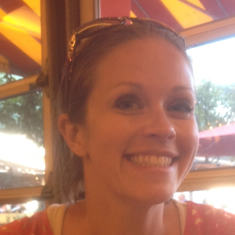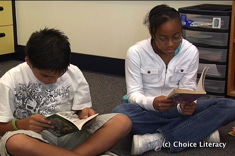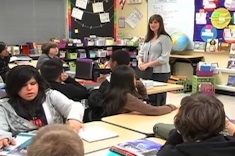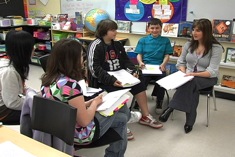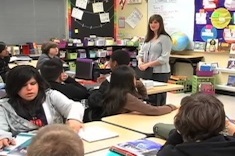“Mrs. TAYLOR!”
“What was that from?”
”Wow — you are SWEAT-YYYY!”
I hear lots of giggles.
“Last weekend,” I started, “I ran a half marathon in Oxford, which is where I went to college. You’ll remember that a few weeks ago, I ran the quarter marathon here in Dublin, and I really wasn’t happy with my time. Remember that? I was a total quitter, and, because it’s just how I am, I’ve been really bothered by that.” Heads nodded. Middle school teachers know that kids are all ears when it comes to personal tidbits unrelated to school.
It was early October, and we were just on the other side of our first full month of school. For reading workshop, this meant that it was time for us to revisit our first monthly reading goals and consider what was and was not working for us as independent readers. I find satisfaction in goal-setting in my own life, including when it comes to my reading, but I know that to hook most middle schoolers, it takes more than an animated presentation about the joys of reading goals. I needed to pull out the sweaty picture. My students gaped at an enormous photo of me in a soaked black t-shirt, thick pink workout headband, hived-out face and neck, and dripping wet ponytail.
I then went on to tell my students that I had signed up for the half marathon to get myself in a better mindset for my “real” race, which was coming up later in October. At around mile seven, I had realized that I was actually on pace to hit my time goal for the October race; the time would be an exciting four minutes faster than my personal best. I knew at that point if I didn’t try my best, I would lose out on an opportunity to have a very satisfying day. I chose to turn on everything I had, and in the last mile poured everything into hitting my big goal. I knew the short-term discomfort would be worth the payoff in just a few minutes.
“We need to expect more of ourselves. People are wired to make decisions that make them happy right then and there. There were moments that I honestly wanted to sit down on the curb and take a break, but I had to just keep the end in sight. I knew that I could meet my goal, and I had to put the tough stuff aside to just go for it. Goals help us get to places that are worth celebrating.”
Later on, right after the start of the new year, I shared with my students an email I had sent to my husband and to three of my very goal-driven best friends. I’m a person who needs a lot of accountability to stay focused. If I don’t tell people that I’m going to do something, there’s a good chance that I won’t do it. I know this about myself. In my new year’s accountability email I included among other tidbits:
Personal goals (relinquish the laptop and phone between 4:30-7 p.m.)
Athletic goals (achieve a new personal best in a 5K)
Health goals (give up soda)
Family goals (call my grandmother at least once a week)
Reading goals (read at least one professional book a month)
Students chimed in with their own personal goals, and goal achievement gradually became a part of our classroom culture. They delighted in calling me out when I’d snuck out for a large soda during lunch time (sometimes a girl just needs a fountain pop!), reminded me not to return emails until after my daughter went to bed, and loved pestering me to see if I’d met with my running group on my regular running mornings.
The Goal-Driven Reader
Running is something that I care about, which made the end goal significant to me. The barrier for many middle school students is that the benefits of being a lifelong reader are still too abstract for them. When I start to build a goal-driven mindset in my students, I weave in example upon example of the importance of reading. The best resource I’ve found to support this work at the secondary level is Kelly Gallagher’s Reading Reasons. Among my class favorites: “Reading builds a mature vocabulary.” “Reading is hard, and hard is necessary.” “Reading well is financially rewarding.” My add-on: reading makes you a more interesting person to talk to.
With those reading motivation lessons frontloading our year and playing an ongoing role in our reading talk, we spend daily formal and informal time developing goal-driven mindsets. To engage my nosy middle schoolers, I share with them my reading goals and my personal goals, opening up to them about my progress, my celebrations, and my challenges. We constantly revisit phrases that could apply to nearly any activity: Did you try to do something outside your comfort zone today? Did you try to do something to grow your brain? Are you making choices that will give you options for the future?
The more we talk goal setting in a non-threatening manner, the more natural it is to become goal-driven readers; students become comfortable with the idea of setting satisfying and appropriate levels of challenge. Armed with a new level of comfort with the goal-setting process, these readers are ready and able to move to the next level of independence: problem solving as they face challenges in their reading journeys.


